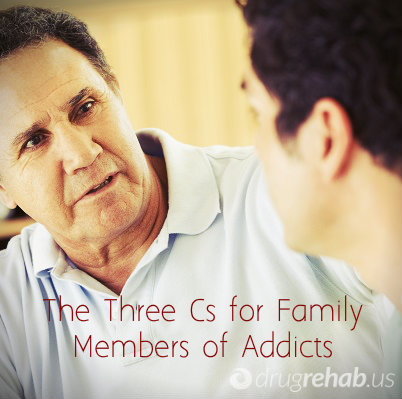Family Must Help To Fight Addiction – The Three Cs For Family Members Of Addicts
In June of 2014, the Delaware News Journal partnered with Christiana Care to host a forum on the heroin crisis gripping the state, but several questions from audience members were left unanswered. Panelists at the event willing to work with the Delaware News Journal have offered to answer some of these questions in an ongoing feature, and Don Keister, co-founder of the anti-addiction group atTAck and whose son died of heroin addiction in 2012, has stepped forward for the task. The question he answered revolved around what you should do when an adult child who lives with you—and has children of his or her own—is struggling with addiction but won’t get help, and his response offers important advice to anybody suffering similar issues.
The Three Cs For Family Members Of Addicts
Keister offers a core piece of advice from Al-Anon: remember the three Cs.
You didn’t cause it,
you can’t control it
and you can’t cure it.
 If someone you care about is suffering from addiction, there’s an inclination to try to take too much on your shoulders or even to feel guilt, but this is unhealthy.
If someone you care about is suffering from addiction, there’s an inclination to try to take too much on your shoulders or even to feel guilt, but this is unhealthy.
You’re in no way responsible for what is happening. It’s only natural to want to fix the problem for your child, but addiction isn’t like a scraped knee or a period of minor financial trouble: it’s not something you can rectify for them.
By trying, all you’ll do is make yourself more stressed and unhappy. It may seem puzzling given the situation, but you need to care for yourself as well as your family member.
That’s the real purpose of the three Cs: you need to truly understand that you aren’t to blame, and you can’t heap all the responsibility onto your own shoulders.
No Single Solution To Recovery
Sadly, there isn’t a single road you must follow to recovery. You need to think about what works for you and your family as individuals, but it is important that you’re there to offer support. You need to continue to love your child, and of course the same goes for your grandchildren.
Although you can’t force somebody to get help, you should do whatever you can to support and encourage your son or daughter to go into recovery. Even if your child won’t get help, you shouldn’t blame him or her for the issue either; addiction has many causes and it isn’t productive to become angry with or resentful of somebody struggling with it. Your child always needs to know you’re acting out of love and concern for his well-being.
Addiction As A Family Disease
Keeping all of that in mind, it’s important you recognize that addiction is a disease that affects entire families. The most obvious affected parties are your grandchildren: your son or daughter is unlikely to be capable of offering the level of parental care they need, and this is one area where your support is invaluable.
However, as the three Cs point out, you need to care for yourself too. The challenge is staying as healthy as you can while still being there to help the entire family unit—including the addict—get through this together. This is especially important if you’re all living together, but it makes it all the more difficult to avoid taking too much responsibility yourself.
Importance Of Getting Additional Recovery Support
That’s why getting additional recovery support is essential. Even if the addicted individual won’t get help, groups like Al-Anon exist to offer support to the loved ones of addicts, and can help you get through the problems you’re facing. Addiction isn’t easy for anybody in the family, and if you’re having difficulty, help is available.
Keister’s advice might not have been what you were hoping for, but it’s realistic, and attests to his personal experience with the problem. As much as you may want an easy fix, it doesn’t really exist. Things can and hopefully will get better, but until then, all you can do is be as supportive as possible and make sure you look after yourself, too.
If You Need Help With A Family Member’s Addiction – Call Us Now!



